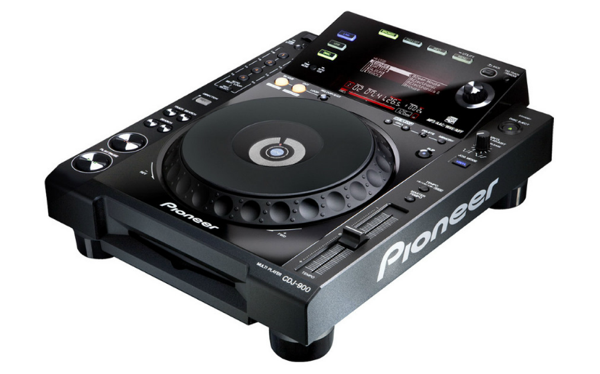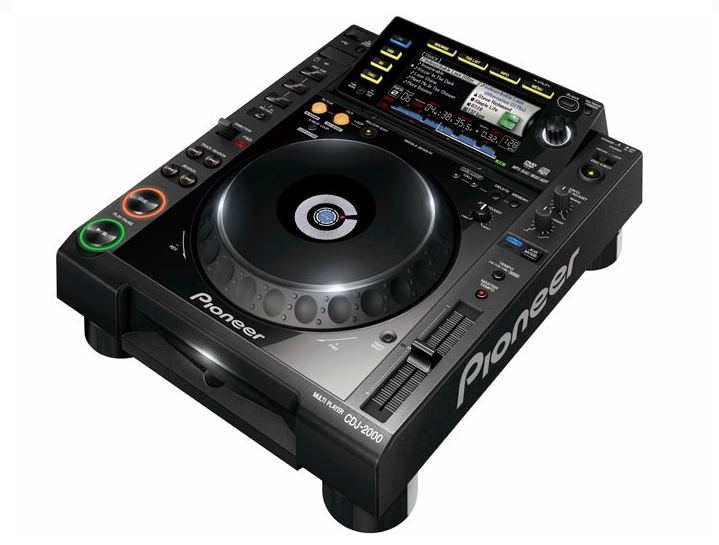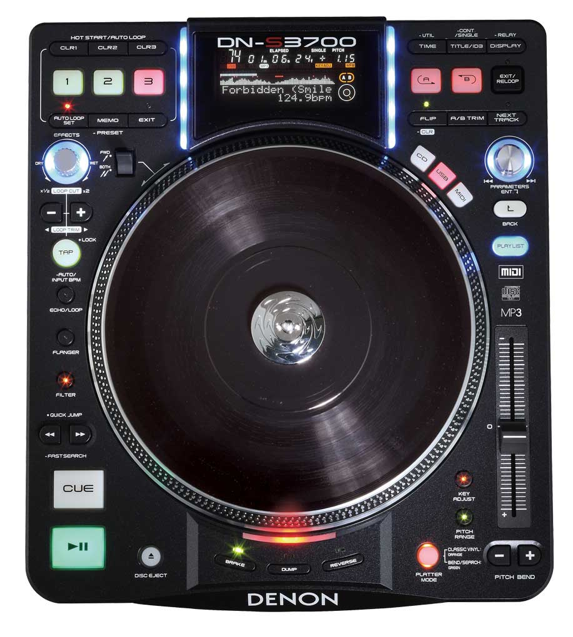DJ GEAR: MIXING WITH CDS
Posted on Tue 13 March 2012 in entries

In the modern DJing world, mixing with CDs appears to now rule. DJs that once swore by vinyl have been tempted by the lower cost of burning CDs (compared to cutting dubplates), and the fact that you can carry round whole albums and playlists on small, lightweight silver discs rather than having to select possibly 50-100 tracks for a night and then wearing out your shoulder dragging them into a club!
The fact that every big club is practically guaranteed to own a pair of Pioneer CDJ turntables (and have them set-up and in full working order) is also a huge bonus when learning to mix on CDs. For this reason, many DJs that dabble in laptop DJing also tend to carry around a selection of CDs, just in case it is impractical to set-up their laptop based system in a club, or in case their computer crashes!
The basic principle behind mixing CDs is exactly the same as mixing with vinyls (providing you’re not using the BPM readouts found on some CD turntables); you’re listening to different tracks through different ears and trying to synchronise the tempo of each and then blend them together in a way that makes musical sense. However, there are some very subtle differences between how each method 'feels'. I don’t mind admitting that although I can usually sync two vinyl records within 10 seconds, it takes me at least three times as long to lock two CD tracks together. There’s just something about mixing on a turntable with a small, static platter that messes with my mind! I’m sure if I mixed on them more, I would no doubt get used to this way of working, but the point is, there is a difference!
Difference number two: when mixing with vinyls, you can actually see the basic layout of the track due to the visual tone of the grooves. This allows you to predict how a track will evolve, even if you aren’t too familiar with it. Although some fancy CD decks do have a waveform view (which allows you to do a similar thing), most don’t, so you really need to rely on your musical memory.
With records, you can also instantly access any part of a song by picking up the needle and dropping it into a specific groove. This is excellent for creative purposes, for when you want to mix a record from a part other than the start of a song. On CDs, you cannot do this. With CDs, you need to navigate through a track to find the part that you want to ‘cue’ (start) the record from. You then need to save this point, and from then on you can jump to that point with the touch of a button. It’s a lot quicker than jumping to a cue point on a vinyl once you have set it, but it does require a bit of extra time and planning beforehand.
Depending on what quality of CD deck you have, you may also find a host more controls on there that you wouldn’t get on standard vinyl turntables. Additional controls may include pitch lock (adjust the tempo of the song without altering the pitch), adjustable start and stop speeds (for long-drawn out accelerating/decelerating starts/stops), loop controls, selectable pitch ranges, multiple cue points, etc. In terms of creative flexibility, these features make CD decks superior to vinyl turntables, especially when you consider that most modern CD decks also allow you to perform natural scratching. All things considered, there is no wonder that CD decks have become so popular.
![]()
CD DECK RECOMMENDATIONS
As far as my recommendations go, I'm going to try and cover a variety of different CD mixing products, starting off towards the lower-priced/hobbyist end of the market and gradually building up to the big boys toys!
![]()
This is an ideal DJ product for anyone that loves playing records, but isn’t fussed about breaking into the professional club-scene. Essentially, if you’re a mobile DJ who plays pubs, weddings, birthday parties, etc. and the crowd aren’t going to expect you to be pulling off slick, complex mixes full of effects and scratching, then the iCDMIX 2 is for you.
It’s essentially an all-in-one unit, featuring two CD decks and a basic mixer. You can use the iCDMIX 2 to cue your tracks, alter the speed of your tracks (for beat-matching) and to EQ your songs, so you have everything that you need to perform basic mixes. It even comes with two small jog wheels, a microphone channel and a basic looping feature. You can even use it as a mixer if you plug external turntables into it and it features an iPod dock for playing your favourite MP3s!
For more information on the Numark iCDMIX 2, click the link below:
Numark iCDMIX2 - More Info/Buy
![]()
The MixDeck is essentially the step-up from the iCDMIX 2. Again, it is an all-in-one unit with two CD drives and a mixer section, but it features a number of professional controls that lend it more to club DJing and DJs that want to spice up their mixes a little more creatively!
First and foremost, it features two large touch-sensitive (and illuminated) jog wheels, which make cueing extra easy, and they also allow you to perform complex and realistic scratching. The MixDeck also gives you an adjustable start and stop control for cool accelerating/decelerating effects, selectable pitch ranges (for accurate track-specific mixing), a creative bleep/reverse feature, built-in DSP effects and a looper.
The MixDeck also features an iPod dock, which has its own channel on the mixer, meaning that you can play your favourite MP3s (or record mixes straight to an iPad app). Plus, each deck features a USB input, so you can plug in a USB stick and mix tracks off there! You can also plug external decks into the MixDeck, or mix tracks from your computer. Plus, you can even use it as a controller for the included Native Instruments Traktor Numark Edition software! Basically, the MixDeck caters for almost every possible style of mixing!
The Numark MixDeck is a fantastic product for any DJ that does not have the budget to splash on two separate CD decks and a mixer, as it features everything you need to learn basic beatmatching, plus a lot more! Plus, it’s also great for playing mobile parties!
For more information on the Numark MixDeck, click the link below:
Numark MixDeck - More Info/Buy
![]()
• Pioneer CDJ-350 (available in black or white)
We’re beginning to creep into the realm of the professional club DJ now. Pioneer are the industry leaders in CD decks, and the CDJ-350 gives you an entry into their world. The deck itself features a high-quality build, a basic Pioneer layout (so you should be familiar with the placement of all the basic controls if you are ever using a more advanced Pioneer deck in a club) and a small selection of additional professional features, including looping, BPM Lock, an adjustable pitch range and a fantastic-sounding scratch-mode.
The CDJ-350 even allows you to mix tracks from a computer or from a USB stick – something that has recently snowballed in popularity as it means that you don’t need to burn off hundreds of CDs to keep up with trends – instead, simply carry your library or a specific selection of songs on a couple of USB sticks and you can pop them in your pocket at the end of the night and join the party without worrying about whether your record collection is safe, tucked away in the corner of the DJ booth.
Plus, because the CD-350 supports 'rekordBox', this means that you can create beatgrid markers on a computer and store them within the file itself, so you can perform perfect loops and mixes every time.
The Pioneer CDJ-350 is available in either a black or a white model.
For more information on the Pioneer CDJ-350, click the links below:
Pioneer CDJ-350 (Black) - More Info/Buy
Pioneer CDJ-350 (White) - More Info/Buy
The DN-S3700 is a CD turntable that is jam-packed full of features. As well as featuring 5 built-in DSP effects and looping, the DN-S3700’s stand-out feature has got to be its 9 inch spinning direct-drive platter.
Built to look and feel like a vinyl platter, the DN-S3700 allows you to mix CDs or MP3s in a way that provides you with a more traditional feel. Because of this, the DN-S3700 is particularly suitable for long-serving vinyl DJs, who are used to working with moving parts, but want to work in the more flexible format of CDs and it’s therefore also a very appealing product for scratch DJs. You can even plug in a USB stick with your music library on to access and mix your tracks, which is great for portability purposes and the screen displays a host of information about the currently playing song, including a waveform view, so it is easy to see how a track is going to progress even if you’re not familiar with it.
For more information on the Denon DN-S3700, click the link below:
Denon DN-S3700 - More Info/Buy
![]() >
>
• Pioneer CDJ-900
The CDJ-900 is a multi-format player from Pioneer. As well as featuring Pioneer’s renowned build, design and performance, it is packed with professional features and also allows you to mix tracks from a USB stick.
The CDJ-900 also has support for ‘rekordbox’, a piece of software that adds many of the benefits of mixing with laptop software. For starters, rekordbox stores all your songs, and allows you to view large waveform displays of each of them, which can be very useful in live situations for visualising how a song is structured. Plus, you can also try out loops, create playlists and export your tracks to USB. However, most impressive of all is that you can create track quantize markers in the rekordbox software and then store them in the audio files, which means that you can confidently automatically beatmatch songs or create seamless loops on your CD decks, because all your actions are snapped to the quantize grid (which you can of course test in the software first to make sure that it is correct and edit if necessary).
In the current DJ climate, mixing with a rekordbox compatible CD deck and a USB stick is probably the most flexible and practical DJ solution out there.

For more information on the Pioneer CDJ-900, give us a call on 01202 597180 or use our online Live Chat service.
• Pioneer CDJ-2000
At the time of writing, the Pioneer CDJ-2000 is the king of the CDJs! As well as being able to play CDs and tracks from a USB stick, and having access to rekordbox software (see ‘Pioneer CDJ-900’ notes above for more information on this), it also contains a number of the most advanced professional DJ features around, such as the ‘Needle Seach’ touch ribbon, so that you can skip to specific un-cued parts of a track without having to search through an entire song!
The Pioneer CDJ-2000 also features the largest, most informative colour touchscreen available on a CD deck and it offers Pioneer's best sound quality ever!

For more information on the Pioneer CDJ-2000, give us a call on 01202 597180 or use our online Live Chat service.
